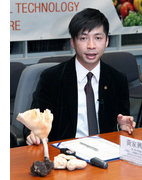 Over the years, scholars from around the world have been actively developing health and anti-cancer foods to help people stay healthy and enhance their resistance to illness. Recently, Dr Wong Ka-hing, Associate Director of PolyU’s Food Safety and Technology Research Centre and Assistant Professor of the Department of Applied Biology and Chemical Technology, used African Tiger Milk mushroom in cancer research. With this breakthrough, he won the Young Investigator Award in the 2011 International Conference of Food Factors. In this issue, we are pleased to have invited Dr Wong to share his research findings with us. Over the years, scholars from around the world have been actively developing health and anti-cancer foods to help people stay healthy and enhance their resistance to illness. Recently, Dr Wong Ka-hing, Associate Director of PolyU’s Food Safety and Technology Research Centre and Assistant Professor of the Department of Applied Biology and Chemical Technology, used African Tiger Milk mushroom in cancer research. With this breakthrough, he won the Young Investigator Award in the 2011 International Conference of Food Factors. In this issue, we are pleased to have invited Dr Wong to share his research findings with us.
Q1: Please introduce this research and its findings.
By using the polysaccharide-protein complex extracted from the African Tiger Milk mushroom, I have successfully prepared highly stable selenium nanoparticles. The preliminary study found that these stabilized selenium nanoparticles could significantly inhibit the growth of breast cancer cells by apoptosis.
Q2: What is selenium? What are its special properties?
Selenium is a trace element which is essential for human health. It has excellent bio-availability, low toxicity and strong anti-cancer activity. However, nanoparticles would easily stick together, and their special properties will be lost once the aggregates exceed nano-size. That is why scientists around the world have been exploring ways to stabilize the nanoparticles.
Q3: From which part of the Tiger Milk mushroom did you extract the polysaccharide-protein complex?
The polysaccharide-protein complex was extracted from the sclerotium of Tiger Milk mushroom. I would further research on whether its other developmental stages (e.g. fruiting body) could be used for this cancer research.
Q4: What will the next stage of the research involved?
I would evaluate the anti-cancer activity of those stabilized selenium nanoparticles on animals, and elucidate the underlying mechanism of their growth inhibition effects on breast cancer cells.
Q5: What is your expectation on this research?
Since this study is the first of its kind in terms of preparing highly stable selenium nanoparticles with the use of mushroom polysaccharide-protein complexes as stabilizers, I hope that ultimately a functional food or health product could be developed. The research findings also provided insights on using these novel nanoparticles as a new drug for cancer chemoprevention.
|